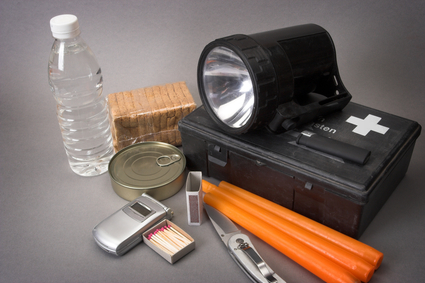Before a flood...
Being prepared means being equipped with the proper supplies you may need in the event of an emergency. Keep your supplies in an easy-to-carry emergency preparedness kit that you can use at home or take with you in case you must evacuate.
Minimum Supplies Needed:
-
Water: one gallon per person, per day (3-day supply for evacuation, 2-week supply for home)
-
Food: non-perishable, easy-to-prepare items (3-day supply for evacuation, 2-week supply for home)
-
Flashlight
-
Battery-powered or hand-crank radio (NOAA weather radio, if possible) and extra batteries
-
First Aid Kit
-
Medications (minimum 7-day supply) and medical supplies (hearing aids with extra batteries, glasses, contact lenses, syringes, etc)
-
Copies of personal documents (medication list and pertinent medical information, proof of address, deed/lease to home, passports, birth certificates, insurance policies)—store in air-tight bag
-
Sanitation and personal hygiene items
-
Cell phone with chargers
-
Family and emergency contact information
-
Blanket(s)
-
Map(s) of the area
-
Extra cash
Prepare an 'After-Emergency-Checklist':
-
If food or medicine has come in contact with flood waters, throw it out.
-
Stay out of buildings if flood waters remain around the building.
-
When entering buildings after a flood use extreme caution.
-
Wear sturdy shoes and use battery-powered lanterns or flashlights when examining buildings.
-
Examine walls, floors, doors and windows to make sure that the building is not in danger of collapse.
-
Watch out for animals, like snakes, that may have come into your home with flood waters.
-
Take pictures of the damage - both of the house and its contents for insurance claims.
* Store items such as medications and documents or other water-damageable items in air-tight bag or container.
Consider the needs of all family members and add supplies as appropriate:
- Babies: Bottles, formula, baby food, diapers and wipes
- Children: Games, activities and any favorite items
- Senior or disabled people: Walker
- Pets: Food, bowl, carrier, collar and leash
* These items are suggestions; take time to consider any additional needs that you or your family may require.
Additional supplies to consider for your kit:

- Two-way radios
- Extra clothing
- Extra set of car keys and house keys
- Manual can opener
- Whistle
- Sanitizing or disinfecting supplies
- Matches
- Rain gear
- Multi-purpose tool
- Tools/supplies for securing your home
- Work gloves
- Duct tape
During a flood...
Implement your disaster preparedness plan:
-
Monitor local weather forecasts.
-
Be prepared to evacuate to higher ground if ordered to do so by the authorities.
-
Adhere to any emergency orders of authorities.
-
Do not touch any electrical appliances that are wet or standing in water.
-
Avoid walking or driving through flood waters.
